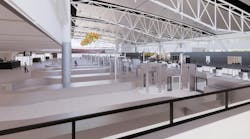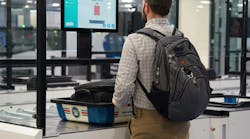Not a month goes by without news of another arrest of a bunch of baggage handlers nabbed for pilfering checked luggage. These folks may never rise to the level of criminal masterminds. Then again, consider for a moment the potential damage that could be done by such airport workers who have security clearance to routinely climb inside aircraft or walk into sensitive areas of an airport around the clock.
Or consider an event in Chicago a few months ago that didn’t even take place at any of the city’s airports, but which still ended up cancelling thousands of flights and disrupted air traffic throughout the United States.
Brian Howard faces up to 20 years behind bars if convicted of one count of felony destruction of aircraft facilities after he allegedly set fire to a Chicago-area FAA air traffic network site.
Howard was caught on surveillance footage dragging a suitcase and can of gasoline through a security checkpoint and into the Chicago Air Route Traffic Control Center early one Friday morning last September, according to charging documents filed in court. It sounds as if he knew where to cause the most havoc since he allegedly set the fire near telecommunications cables where a floor panel had been pulled away to expose the wires.
The breach that enabled him to carry out his plan speaks to a continuing trend in the aviation industry that most security experts say is ripe for abuse: an over-reliance on third-party contractors whose workers are often paid low wages and are not screened properly, but who have easy access to some of the most vulnerable areas of the nation’s biggest airports.
Most reports I’ve read related to this issue discuss not so much the paycheck as much as that such workers don’t have the same “buy-in” to the job that a full-time worker would have. This lack of identity is what has security experts so concerned.
Howard, for example, worked for eight years as a contracted field tech for Harris Corp., which provides telecommunications service for several federal agencies, including no less than the Department of Defense.
In 2002, Harris won a $5 billion contract with the FAA to provide service at more than 4,500 of the aviation regulator’s sites in the United States.
The aviation industry has certainly outsourced a number of key jobs that include baggage handlers, refuelers, cabin cleaners and gate agents. I’ve read that as much as half of ground service provider jobs have been outsourced by airlines internationally.
Richard Bloom, director of terrorism, intelligence, and security studies at Embry Riddle Aeronautical University in Prescott, AZ, says contracted employees can be less accountable than full-time employees, and that screening is often “perfunctory,” only involving criminal background checks.
“When it comes to in-house sabotage, much more often than not, you’re not going to catch any of that if you only look at bank accounts and arrests,” he told a newspaper after the FAA fire. He advocates frequent rescreening to detect psychological issues that could be flagged early.
“Often people who engage in [sabotage] are fine when they are hired," he added, "but over a period of time, they change. There are objectively valid screening procedures that can monitor people on an ongoing basis and if they change for the worse, fire them or talk to them or deter them.”
And by the way, our Ground Service Provider app was recently named a Finalist in the 2014 Ozzie Awards for FOLIO, a trade magazine that covers the magazine industry.


